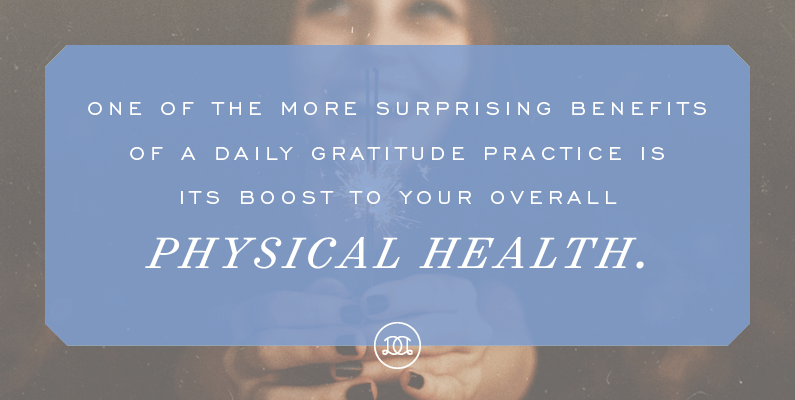There are so many benefits to expressing gratitude! We’ve already gone over a lot of them this month—but one of the more surprising benefits of the practice is its boost to your overall physical health.
That’s right, something as simple as listing a few things you’re grateful for in your Day Designer every day can not only make you happier—it can keep you healthier, too!
In recent studies, a regular gratitude practice has been linked to these five physical health benefits (and more!):
1. Reducing Feelings of Depression
Depression is a serious, often debilitating disease—but it doesn’t have to take over your life. In fact, scientific studies have shown that gratitude can significantly reduce the presence of depression in your life. When you feel and express gratitude on a regular basis, you start to change your neurochemistry. Regularly expressing gratitude can actually change the neural pathways (the foundations of how we all think, feel, and act) in your brain. And if your neural pathways currently point toward anxiety and depression, a regular gratitude practice can shift them.
It makes sense, too. To constantly focus on what annoys you or stresses you out is a lot more likely to trigger feelings of anxiety and depression. On the other hand, making it a daily practice to focus on what is good in your life—and how thankful you are for it—will nip many feelings of melancholy in the bud before they spiral out of control.
2. Offering an Energy Boost
Several studies have found that levels of gratitude correlate with increased energy. One study on gratitude even found that keeping a weekly (not even daily!) gratitude journal correlated with higher instances of exercise in participants! In other words, the more you feel grateful, the more physical energy you have to exercise (or go grocery shopping with the kids after work).
Though gratitude and physical energy may not seem obviously related, the connection makes sense. Feeling gratitude on a regular basis heightens your awareness of the many great things in your life (while fuzzing the focus on things that are perhaps not going quite right)—and if you love your life, it makes sense that you’d feel a greater excitement, vitality, and energy to live it and live it well.
3. Strengthening Your Heart
Most can agree that feeling and expressing gratitude on a regular basis increases an overall sense of well-being. It becomes that much harder to feel badly—physically, emotionally, mentally, or spiritually—when you’re laser-focused on all that’s good in your life.
And apparently, this is true even for people who are already physically ill. A 2017 study found that heart-failure patients who journaled feelings of gratitude for just two months “showed reduced markers of inflammation as well as increased heart rate variability (HRV), when compared to patients who received usual care alone.” While this incredible connection is still being explored, there seems to be an undeniable link between regular gratitude and increased heart health.
4. Increasing Dopamine Levels
Dopamine is the “feel good” chemical inside your brain. Often called the “reward” neurotransmitter, you feel good when you get it—which makes you want to get a hit of it again and again.
Sometimes this can be a bad thing, like the dopamine hits that encourage addiction of negative substances or activities. But sometimes it’s a really good thing—like when you think about what you’re thankful for, good feelings flood your body, and you think to yourself, “Yes, more of that, please.”
Dopamine can be a really positive chemical. It can increase motivation, attention, creativity, and productivity, amongst other things. When rewarding the “right” activities—like feeling grateful, for instance—dopamine has the power to create positive habits, and easily change your life for the better.
5. Improving Your Sleep
In a 2012 study, a group of Chinese researchers found that higher levels of gratitude were linked to better sleep. In fact, it’s been found that gratitude improves not only the quality of sleep, but also lessens the amount of time it takes to fall asleep and increases the amount of time you stay in that blissful, dreamlike state.
Again, the connection is clear. Have you ever tried to get a good night’s sleep when you’re stressed, anxious, or sad? Even if you can drift off, sleep is usually fitful and not particularly restful. It’s a lot easier to fall (and stay) asleep when you’ve got grateful thoughts of the good in your life on the brain.
Have you experienced the physical health benefits of a gratitude practice? If not, what physical health benefits would you like to experience? Share your thoughts with us below!
The signature daily planning page of the Day Designer Flagship Planner offers space for you to record your daily gratitude. Sign up for a free copy here and see how it works for you!
